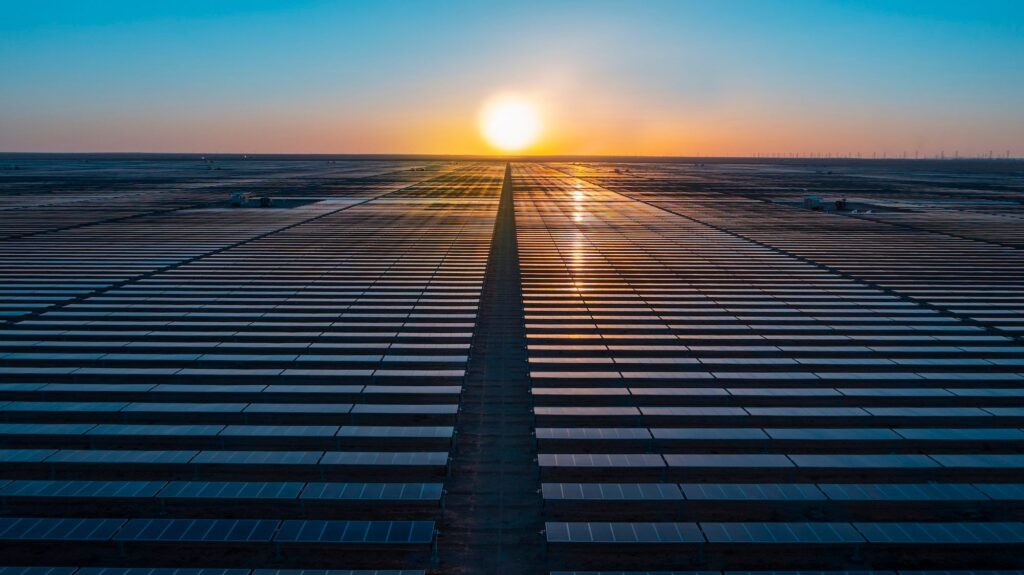
Acwa Power
The GCC’s energy landscape is undergoing a profound transformation.
As global economies shift towards sustainability, Saudi Arabia and the UAE are spearheading efforts to diversify energy sources while maintaining economic competitiveness.
However a critical question remains: can taxation policies accelerate this transition and position the region as a global leader in renewable energy?
With Saudi Vision 2030, Saudi Net Zero 2060 and the UAE Energy Strategy 2050, fiscal policies are playing an increasingly important role in shaping investment incentives and market dynamics.
Saudi Arabia aims to generate 50 percent of its electricity from renewable sources by 2030 and to achieve net zero by 2060, while the UAE is targeting 44 percent clean energy in its energy mix by 2050.
The challenge lies in reducing dependence on fossil fuels while fostering a taxation framework that promotes renewable energy development, ensuring economic resilience and maintaining the delicate balance between growth and climate commitments.
Saudi Arabia and the UAE have both undertaken major renewable energy projects, such as the Sakaka Solar Power Plant and Dumat Al Jandal wind farm in Saudi Arabia. The kingdom has also launched a domestic carbon market to align with international standards while fostering low-carbon growth.
The UAE, meanwhile, has invested heavily in projects such as the Mohammed Bin Rashid Al Maktoum Solar Park and the Barakah Nuclear Energy Plant, demonstrating a strong push towards energy diversification.
The Abu Dhabi Global Market (ADGM) carbon trading market is further solidifying the UAE’s leadership in sustainability-focused financial instruments.
Reforming fossil fuel subsidies remains a crucial yet politically sensitive issue
However fiscal policies must align with these ambitious projects to drive long-term sustainability. Taxation can serve as both an incentive for renewable energy investment and a disincentive for carbon-intensive activity.
Saudi Arabia introduced a corporate income tax in 1950 under the income tax law, applying it to foreign entities, while Saudi nationals remained subject to zakat. The law underwent significant amendments in 2004 to align with international standards.
The UAE implemented its first federal corporate income tax in June 2023, with a 9 percent tax on business profits exceeding AED375,000 ($102,110).
In addition to corporate taxes, both countries have implemented taxation measures to increase non-oil revenues.
Saudi Arabia introduced a 5 percent VAT in 2018, increasing it to 15 percent in 2020. The UAE implemented VAT at 5 percent in 2018, applying it across most goods and services to diversify revenue sources.
Both nations also imposed excise taxes on tobacco, sugary drinks and energy drinks in 2017 to promote healthier consumption patterns while boosting fiscal revenues.
Reforming fossil fuel subsidies remains a crucial yet politically sensitive issue. While both Saudi Arabia and the UAE have made strides in gradually reducing these subsidies, further redirection of funds towards renewable energy development is essential.
The UAE’s decision to phase out fuel subsidies in 2015 serves as a model for financial reallocation towards sustainability.
Saudi Arabia is gradually undertaking similar reforms, recognising the need for a balanced energy pricing model that reflects economic and environmental priorities.
Carbon markets represent another crucial policy tool. Saudi Arabia’s Regional Voluntary Carbon Market facilitates emissions trading, creating incentives for businesses to reduce their carbon footprint. The UAE’s ADGM has a carbon trading platform, providing a financial mechanism to support emissions reduction efforts in the private sector.
Moreover sector-specific policies have been introduced to support the energy transition. The UAE established a green finance framework to attract investments in sustainable projects. And Saudi Arabia’s Saudi Green Initiative and domestic carbon market align with international standards such as the EU’s Carbon Border Adjustment Mechanism, which imposes levies on carbon-intensive imports.
The GCC can draw valuable insights from global taxation and environmental policies. Canada’s carbon pricing system and Singapore’s green finance initiatives illustrate effective models for integrating fiscal measures into sustainability strategies.
A well-structured carbon tax in the GCC, with reinvestment in clean energy projects, could drive meaningful change without damaging economic activity.
Collaboration with international organisations such as the International Renewable Energy Agency can provide technical expertise and policy guidance to accelerate the energy transition.
Fiscal incentives for research and development in clean energy technologies, including hydrogen production and energy storage, will further strengthen the region’s position in global sustainability efforts.
The transition to renewable energy presents both challenges and opportunities for the GCC. Policymakers must navigate the trade-off between short-term revenues from fossil fuels and long-term economic gains from sustainability investments.
While fossil fuel subsidy removal has been found to be one of the most effective tools for reducing carbon emissions, evidence suggests that combining it with a well-calibrated carbon tax would amplify the impact on emission reductions.
Manal Abdel-Samad is a senior adviser in fiscal policy and organisational restructuring. She was minister of information in the Lebanese cabinet



